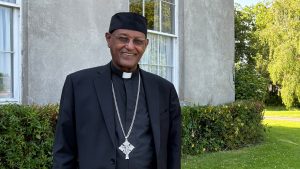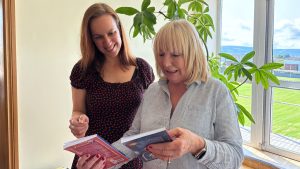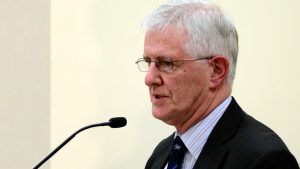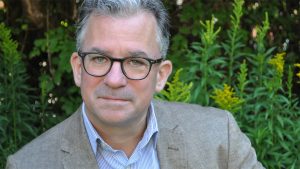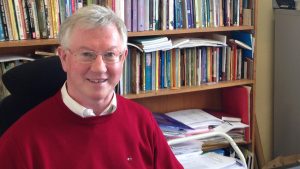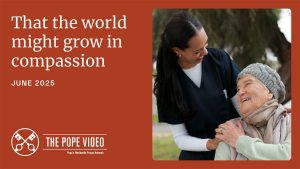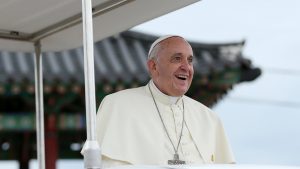A difficult experience of priesthood
 Shortly before he passed away, Des O’Brien SJ wrote for Spirituality, a Dominican publication, this affecting meditation on living as a priest while knowing that he had an inoperable condition.
Shortly before he passed away, Des O’Brien SJ wrote for Spirituality, a Dominican publication, this affecting meditation on living as a priest while knowing that he had an inoperable condition.
Having spent just under forty years working in Zambia as a missionary priest, I came home to Ireland in September 2005 on three months scheduled leave to discover I had inoperable lung cancer. This in itself was quite a shock. But when I began to lose my voice in the hospital just a few days after the diagnosis because of damage already done to the nerves attached to the vocal chords by damage done by the tumour I became quite alarmed. Up until the time of writing this reflection, my voice has not recovered much, and is not likely to in the future. It remains a soft, sometimes almost inaudible whisper. This precludes me from saying public Masses, preaching and carrying out the normal ministerial works. Even talking for a short time is both tiring and tiresome. One day a good Jesuit friend jocosely said to me, ‘Anyway, it’s about time you began to listen, you’ve already talked enough to last you for the rest of your life.’ What chance is there of succumbing to self-pity with friends like that! But how true he was! Now I have to spend most of my time listening, re-learning how to be with and present to people, and how to be a priest in such changed circumstances.In the summer of 1981, Fr Pedro Arrupe, the General of the Jesuits, was struck down by an illness that left him paralsyed and eventually led to his resignation from office. When I began to engage in my own struggle with cancer, I was very much inspired by his Message to the 34th General Congregation delivered on the 3rd of September 1983: “More than ever, I now find myself in the hands of God. This is what I wanted all my life from my youth….. But now there is a difference: the initiative is entirely with God. It is indeed a profound spiritual experience to know and feel myself so totally in God’s hands.”
For a long time before my illness I had been attracted to these words and learned them by heart because of the surrender implicit in them. But now they spoke directly to my present concrete circumstance and said something central about how to continue to live out the priesthood under the limitations I was experiencing.
As these words of Arrupe are recorded in Decree 6 of GC34 on Ministerial Priesthood and Jesuit Identity, I decided to return to the decree and have another look at it to see if I could find strength in my struggle to accept these new limitations I was experiencing. I am very grateful for the grace of never having lost the belief that something good would come out of my present painful situation, the loss of health and voice. I smiled inwardly as I recalled the humorous but instructive story I had once been told of the man who met his future wife at a funeral.
In #29 of the decree I found what I was looking for, and where the text speaks of ‘old age’, I put in ‘incapacitating illness.’ I will not quote the entire text here but it talks about, “the time when external work must cease (because of old age) and one is tempted to think that his life has lost its primary purpose”. It continues by pointing out that the Jesuit “needs to learn from the Lord that, on the contrary, he is being offered a new way of carrying out his Jesuit apostolic mission…which in no way diminishes his priesthood and true apostolic vitality. Even if he can only attend the Eucharist and pray privately for the Lord’s blessing on the work of the Church and his fellow Jesuits, it is precisely in this that he continues to be a valued apostle and worker”.
It is remarkable how precisely these words described where I actually found myself, attending the Eucharist and praying privately for the work of the Church and fellow Jesuits. When I didn’t feel too sick from the effects of chemotherapy, I was in the habit of concelebrating one of the daily Masses in our parish. That was consoling for a while. But as the weeks and months went by, and I still wasn’t able to recite a part of the Eucharistic Prayer out loud, do a reading, preach, or hear confessions because of my feeble voice, I had the nagging feeling that my life had ‘lost its primary purpose’. I felt I was being forced into premature and silent retirement. To say the least, it was disconcerting.
One Sunday morning, however, having concelebrated a parish Mass, I walked down the isle with my companion to the end of the Church to greet the congregation, as is the custom. As we shook hands and greeted people, an elderly lady made a beeline for me and grabbing my hand, said, “Thanks, Father, for those words”. Surprised by this comment, I replied, “But I didn’t say anything, my voice is too weak”. Leaning over, she whispered in my ear, “Being up there silent on the altar with us every day is a powerful homily”. These few simple words connected me in an extraordinary way with the deeper mystery underlying my present circumstances which I had begun to sense but was resisting, how to be a priest without any normal or visible ministry.
Decree 6 speaks of this as something that has to be “learn(ed) from the Lord”. It is a grace that “is being offered” and goes on to specify it as “a new way of carrying out….. Jesuit apostolic Mission”. Not only that, but “it is precisely in this,” says the Decree, “that he (the Jesuit) continues to be a valued apostle and worker”, and that “Here, perhaps most of all, he is called to live a life of priestly prayer for others, in union with Christ the High Priest who has gone before us as the pioneer of our faith “(Heb 12:2). It is a new way but not necessarily a better way.
That’s the theology, and that’s the challenge: being offered a new way. Unfortunately, however, ‘seeing’ this is not the same as ‘accepting’ it. Long years of exercising priestly ministry in the normal way have conditioned me to expressing my priesthood by carrying out concrete priestly ministries, i.e. doing things. At the moment, because of my weak health and voice, I cannot do things. I have to be content most of the time with just being a priest. This is a very different thing and is particularly difficult when I see my fellow Jesuits busy in carrying out their ministries. There is the feeling of helplessness, of being useless and unproductive when I can’t join them and help them out.
Some time back, when it became apparent that my treatment had to be ongoing, I was invariably riled by the question I was often asked, ‘But what do you do all day? In order to try and appear normal and productive like everyone else, I used to hastily outline my daily programme in case people would think I was idle or ‘just sitting,’ as we say in Zambia. But this was dishonest. I was being offered a new way (there was no other for me) and sooner or later I would have to come to terms with it. Outlining a daily programme of activity was self-deception, in one sense. It was a little like the bald man Anthony De Mello speaks of, who was busy gathering a collection of combs. But the challenge is more than just being as opposed to doing. It is also being as opposed to be seen to be doing, and furthermore, to be seen to be doing successfully. There is the fear that in my present condition I will not be a crowd-puller. I will have few admirers and even less disciples. This is very threatening terrain for the ‘ego’ and the ‘false self-image’ but is the only approach road to the new way. Indeed it is the only approach to truly living out one’s priesthood whichever way one is called to walk in God’s providence. Whether one walks the normal way or the new way, as the decree calls it, characterized by certain limitations, one has to allow the ‘ego’ and ‘false self-image’ have to be taken on and dismantled by God. This is the work of grace and the challenge inherent in the spiritual journey itself which Thomas Keating says “is not a career or a success story…(but)….a series of humiliations of the false self that becomes more and more profound”. [The Human Condition, Paulist Press, Mahwah, 1999]
So this is where I find myself at the moment, consoled, yet deeply challenged by the words of the decree which clearly state that “Here, perhaps most of all, he is called to live a life of priestly prayer for others, in union with Christ the High Priest”. I didn’t choose this new way of living out priesthood and it is so utterly different from my former more normal, busy way. It is truly a mystery which I hope in time to be able to accept and grow into more fully. In September 2006 I went to Lourdes with some of my fellow Jesuits from Gardiner Street on the Dublin Diocesan Pilgrimage seeking healing. It was a wonderful experience but I came back with a virus that left me flat for many days. However, there was a real healing. I was much more at peace and much more accepting of what had happened me. I am still substantially at peace as I pray daily, “O God, grant me the serenity to accept the things I cannot change…”


